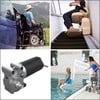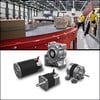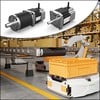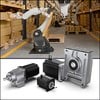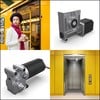Where and when is door automation preferred?
Featured Product from parvalux by maxon
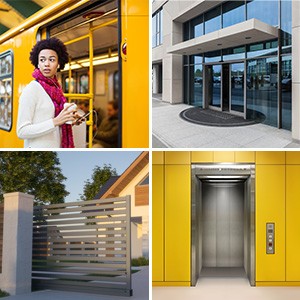
Door automation is a common and indeed important part of everyday life for many people and can mean the difference between a premises being accessible or not.
Automated Door Applications
When deciding on what automated door solutions are right for your premises you need to consider who will be using them and whether you require automatic sliding doors, gate opening systems or revolving doors.
Our motors can be found in four main industries which utilize door automation solutions:
- Building Access – We can provide motors for a combination of door types including sliding, spinning or hinge opening of varying sizes.
- Rail Access – Much of the railway industry has automated access from the doors on the train itself, to platform equipment and ticket barriers throughout the station, and Parvalux are able to provide the appropriate motor for the different applications.
- Elevator/lift Access – There’s nothing worse than an elevator door that won’t open, but the reliability of Parvalux motors ensures that we get elevator door automation right on so many levels.
- Home Access – With smart homes becoming more widespread, with automatic gates and garage doors as well as accessibility automation, having automated doors within the home environment is an important part of our business and we are able to provide the appropriate geared motors for various applications wherever you may live.
If you are in the position to be considering adding door automation solutions to your premises or rolling stock it is important to be aware of the pros and cons of installing such systems. Find out more at How Motors are Used in Door Automation Solutions - Parvalux.
Advantages
- Accessibility – Automated doors make access easier for anyone with mobility issues, or if carrying/pushing heavy materials.
- Versatility – Automated door systems are not a one-size-fits-all and therefore you need to understand what the right door solution is to suit your space, whether revolving, hinged or double doors. All of these come in a range of colours and finishes meaning that whatever you choose will be on brand.
- Convenient – Without the need to open the door manually can make it easier for people carrying things or pushing prams or trolleys. Automated door system can also include the option of opening and closing the door manually as well.
- Energy Saving – Having doors that automatically close after a user has passed through can save energy and therefore can save annual heating and cooling costs, as there is no chance the door will stand open after it has been used. This can also prevent dust and dirt from freely entering the premises making it a cleaner environment.
- Hygienic – In certain environments where cross contamination is a concern, automated door systems can be more hygienic as users don’t have to touch the door to open or close it.
- Secure – Many automated door solutions have different safety measures to ensure users will be able to use them safely, whether that is via a sensor or an alarm to warn of closing or open/close buttons. Additionally there is often an auto-close function which can give you the peace of mind that the door is closed and therefore protecting your property from intruders.
Disadvantages
- Installation – As the door requires electrical wiring to connect the motors and sensors it can be more complicated to install than a standard door and requires a qualified engineer to do so. However, Parvalux motors are designed in such a way that once they are fitted they require minimum maintenance and therefore minimum on-going costs.
- Power reliance – As an electrical system, should there be a power failure, the door could fail to function properly which can mean the need to physically set the door to open (or closed) until power is restored, which could be a security risk.
- Cleaning – An automated door has more moving parts which need to be kept clean in order for the system to work efficiently. This means more and specific cleaning processes are required than with a standard door.
- Investment – Installing automated doors is going to have a larger outlay initially than installing standard doors and maintenance costs can be ongoing. However, with the increased accessibility to the premises as well as the energy savings it will be worth the outlay in the long run.


